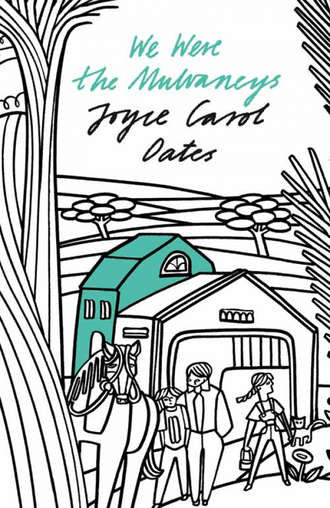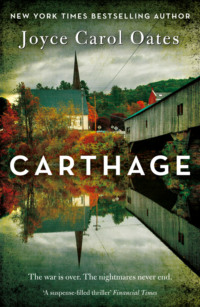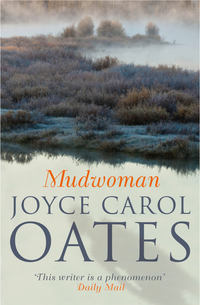
Полная версия
We Were the Mulvaneys
Dad said, winding things up, “O.K., guys! Enough for one day. Any questions?” Mike and P.J. murmured no. “Just so you know your old man loves you, eh? Just so you know.”
I hurried out of Dad’s way, hiding around a corner, and after he’d left I tiptoed back to the doorway, and there were my brothers standing with a shared look as of witnesses to an accident. They didn’t see me but I didn’t hide from them, exactly. Mike was wiping at his eyes, kind of solemn but excited, shaking his head, “—You can’t lie to Dad, it’s the weirdest thing. I mean, you can try, but it doesn’t work. It’s like he knows. It’s like he can hear what you’re thinking. He always understands more than I tell him, and more than I know.”
P.J. had removed his glasses and was polishing the lens on a shirttail. He said petulantly, “I don’t know anything about it! Why am I being blamed?”
Mike said, “You’re not being blamed. Blamed for what? I’m not being blamed, am I?—not that I deserve to be, I don’t.”
P.J. said, “Those guys are your friends, not mine. I don’t even know what they did.”
“Well—I don’t, either.”
“Yeah, I bet.”
“I don’t.” Mike was pacing around, running both hands through his hair. He looked a little like Dad, from the back. He said in a rueful voice, “It’s a funny thing, how you always know more than you say. I mean—a person does. What you say is always less than you know.”
“What’s that supposed to mean?”
“Just what I said! Like if I say, ‘I went out with the guys, we went from point X to point Y, from point Y to point Z’—well, I’m telling the truth, but I’m saying less than I know.”
P.J. looked confused. As if Mike was saying things of the sort P.J. was known for, and P.J., thrown in the position of listener, was at a disadvantage. “But—why?”
Mike said excitedly, “Because to say a thing is just to state a fact. If I say, ‘My name is Mike Mulvaney’ I’m saying a whole lot less than I know about myself, right? It’s impossible to say who I am, where’d I begin?—and where’d I end? So I wind up saying my name.”
P.J. said, “That’s true about any statement we make, isn’t it? We never tell as much as we know.”
“Right! So we’re lying. So almost every statement is a lie, we can’t help it.”
“Yeah. But some statements are more lies than others.”
This, Mike didn’t seem to hear. He’d stopped his pacing and was looking toward the doorway, not seeing me; his face glistened with sweat but he smiled suddenly, as if something had just become clear. “It’s weird, man—it’s like a discovery to me. It means I’m not going to be telling much of the truth through my life, or even know what the truth is. And, for sure, I’m not going to be able to tell Dad anything he doesn’t already know.”
P.J. snorted with laughter.
Later I found Mom out in the antique barn and asked her what was going on, what had Dad been talking about with my brothers, and Mom said she had no idea, none at all—“Why don’t you ask Dad, Ranger?”
I asked Marianne instead. She didn’t know, she told me quickly.
Not a thing.
THE REVELATION
“Cor-rinne! Hello.”
Wednesday morning, a harried errand-morning, and there was Mrs. Bethune the doctor’s wife approaching Corinne, with a smile and a wave of greeting, in the Mt. Ephraim Post Office. Not one of Corinne’s women friends.
Keep in motion, don’t slacken and you’ll escape Corinne instructed herself, smiling vaguely at Mrs. Bethune even as she lifted a hand in an ambiguous gesture—hello, or hasty good-bye?
Lydia Bethune was one of the inner circle of the Mt. Ephraim Country Club, to which the Mulvaneys had belonged for the past three years; always perfectly dressed and groomed, one of that species of attractive, capable women whose very being seemed a reproach to Corinne. For an ordinary weekday morning in Mt. Ephraim, Lydia was wearing, not wool slacks and a soiled parka, like Corinne, but a lovely soft russet-dyed rabbit-fur jacket, one of those unspeakable “fun” furs, and expensive-looking leather boots that shone as if they’d been polished only minutes before. Her hair was beauty-salon frosted-blond, cut stylishly short; her makeup was impeccable; thin smile-lines radiated outward from her pink-lipsticked mouth like Muffin’s whiskers, that seemed to quiver with emotion when he looked up at you. Lydia was a familiar Mt. Ephraim presence, active in charities including of course the hospital women’s auxiliary of which Corinne was a member; her daughter Priscilla was in Patrick’s class at the high school, a flashy girl with a sullen smile—pretty enough, Corinne granted, but thank God not hers.
The inward-swinging door of the post office kept opening, customers kept coming in, Corinne’s escape was blocked. No choice but to stand and chat with Lydia Bethune who was a nice woman, a well-intentioned woman, but who carried with her an aura of perfumed complacency that set Corinne’s teeth on edge.
“Corinne, how are you?”
“Oh, well—you know, busy.”
“Bart says he sees Michael at the club often, on the squash court especially, and I have lunch there sometimes, about once a week. But we never see you there.”
Corinne murmured a vague apology. True, she rarely went to the Mt. Ephraim Country Club, despite the ridiculous six-hundred-dollar yearly dues Michael paid. She wasn’t a woman who golfed, in warmer weather; she had no use for the tennis courts, or the indoor or outdoor pools; if she wanted exercise, she had plenty of house-and farmwork to do. Above all, she wasn’t a woman who “lunched”; the thought made her smile. Dressing up to have expensive lunches, with drinks, with women like Lydia Bethune and her friends!—not quite Corinne Mulvaney’s style. Every few weeks, Michael insisted that they have dinner on a Saturday evening with one or two other couples, or maybe Sunday brunch, with the children, but that was about the extent of Corinne’s involvement. And even then she went reluctantly, like one of her own adolescent children dragooned into something against his will, complaining that she hadn’t the right clothes to wear, or her hair wasn’t right, or she had nothing to say to those people.
Don’t be ridiculous, Michael chided, we’re those people ourselves.
Lydia Bethune was chattering, smiling—a smile that made Corinne uneasy, it looked so forced. “Priscilla says Marianne was so pretty at the prom. I saw the pictures in the paper—”
“Oh, yes.” Corinne’s cheeks burned. Her daughter was so much Corinne herself, how could she accept such a compliment?
“I hope you took photographs?”
“Well—yes.”
“And—” Lydia was a bit rattled, breathless, “—how is your family?”
“My family?” Corinne drew a blank. “Why, the last I knew, they were fine.”
What an awkward encounter. Corinne stood miserably balancing a heavy grocery bag in the crook of one arm and her catchall tote bag crammed with library books in the other. Her parka hood had slipped so she had to tilt her head at an angle to look at Lydia Bethune; if they were to continue their conversation, she really should lower the hood, out of courtesy. Oh but she yearned to escape! Lydia had dredged up another subject, a mutual woman acquaintance who’d just had a cyst removed from a breast, and Corinne murmured yes Florence was lucky it had been benign, trying to back off, edging toward the door. She glanced at her watch and gave a little cry of alarm—“Oh, my God! The parking meter!”
So Corinne made her escape, probably rather rudely. She heard Lydia Bethune call “Good-bye” after her but she did no more than waggle a hand, not glancing back.
Now what had that been all about? She discovered she’d been perspiring inside the nylon parka. Damp circles the size of silver dollars had formed on the palms of her hands.
Not those kind of people. We’re not!
Everyone and everything associated with the Mt. Ephraim Country Club made Corinne uneasy. And when she was uneasy she was resentful, even angry.
She hadn’t wanted to join, of course. It had all been Michael Sr.’s idea.
Already Michael belonged to the Mt. Ephraim Chamber of Commerce, where for years he was one of the younger, more vigorous and more active members, and he belonged to the philantrophic-minded if not very effectual Mt. Ephraim Odd Fellows Association, and he belonged to the Chautauqua Sportsmen’s Club for “social and business” reasons, but for more years than he would have wished to acknowledge (at least fifteen) he’d wanted very badly to be invited to join the Mt. Ephraim Country Club which was the most “selective”—the most “prestigious”—certainly the most expensive—of all; where the richer, more prominent and influential of local citizens belonged, some of whom Michael Mulvaney did in fact count as friends, or anyway friendly acquaintances—the Boswells, the Mercers, the MacIntyres, the Spohrs, the Lundts, the Pringles, the Breuers, the Bethunes. There were not many prominent families in Chautauqua County, still fewer in Mt. Ephraim, but Michael Mulvaney knew them, knew the men; they knew him, and liked him; it wasn’t really an exaggeration to claim they were all equals. This, Michael felt strongly in his heart. He deserved to be a member of the Mt. Ephraim Country Club. He deserved the privilege of playing golf there if he wished, of bringing his family to the Sunday brunch buffet, of having dinner in the elegant atrium dining room overlooking the golf course, of playing poker with like-minded friends, of watching his children play tennis on the courts, of dropping by after business hours for drinks, a cigar, in the Club’s Yankee Doodle Tap Room. Strictly for business Michael insisted, but Corinne understood this was only part of her husband’s motivation, and surely not the largest part.
Oh, she should have been more sympathetic!—Michael Mulvaney, a disowned son of a Catholic working-class family in Pittsburgh, had reimagined himself as a small-town American businessman who owned property, had money and influence, was “known” and “liked” and “respected” in his community. He’d been a loner in his late adolescence, and was now a “family man.” If he’d never be one of the wealthier citizens of Mt. Ephraim and vicinity he had a chance of becoming one of the “well-to-do”—“something of a country squire.” Or, if not quite even that, at least a friend, a friendly acquaintance, a social equal of such. At first Corinne in her awkward way tried to tease him—“Darling, aren’t we enough for you? Your family, your animals? High Point Farm and its debts?” But Michael had only grimaced, hadn’t laughed. Nor was he in a mood to be consoled when, year following year, into the 1970s, on or about March 12, the membership committee of the Club proposed its candidates for balloting, and Michael Mulvaney was overlooked.
Secretly relieved, Corinne would say, incensed, “Those snobs! Self-important, selfish snobs! What do you care? We love you.”
Michael would only shrug irritably, and turn away. No kisses from Whistle right now, no hugs and jokes. No thanks.
Corinne would glimpse her husband outside, in his work clothes, lugging bales of hay, buckets of water into the horse barn. Exercising the horses in the back pasture, with the boys. He’d rise early to clean out the horses’ stalls, feed and bathe and groom the horses—these arduous, least-favorite chores the responsibility, of course, of his children. But there Michael was, working off nervous energy in the barn. He’s that hurt, that furious Corinne thought, shocked. It struck her to the heart, left her weak, disoriented, that, to Michael Mulvaney, after all, his family wasn’t quite enough.
Then, March 1973, a call came, from the Club, followed by an absurdly self-important registered letter, and Michael Mulvaney was in.
(No secret that Michael’s sponsor was his old friend and business associate, a fellow officer in the Odd Fellows, Morton Pringle. Mort who was chief counsel for the First Bank of Chautauqua and who’d hired Mulvaney Roofing for work he’d admired, and recommended to his well-to-do friends. One day, Michael would inadvertently learn that his candidacy at the Mt. Ephraim Country Club had not been unanimously supported. Out of deference to Mort Pringle, and because Michael was, in fact, a well-liked person in Mt. Ephraim, no one had actually blackballed him; but several members hadn’t voted. They’d gone onto the record as abstains.)
Corinne wasn’t happy about the invitation, still less about her husband’s excitement at receiving it, at last. Where was his pride? Where was his character? How could he want to waste his hard-earned money (twenty-five hundred dollars for “induction fees,” six hundred dollars annual dues!) when High Point Farm’s expenditures were relentless, not to mention the children, a family of four healthy active children costs. “We’ve gotten along for almost twenty years without belonging to the Mt. Ephraim Country Club—why join now? Who cares?” Corinne demanded.
Clearly, Michael Mulvaney cared.
Corinne, a Democrat and a liberal, the sort of Protestant who allowed no one to stand between her and God, argued, furthermore, that the Club was un-American, unchristian, immoral—“For whites only! And all male! Women can belong only as adjuncts to their spouses or male relatives!”
“So what?” Michael said.
“So what? Don’t you understand?”
“Corinne, it’s a private club. It’s friends who’ve gotten together, who want a clubhouse, essentially. When the Club was founded, in 1925, there were only twelve men—they were friends. And, eventually—”
“Stop! I can’t believe what I’m hearing! You, Michael Mulvaney—a bigot. A sexist. A snob.”
“What the hell, Corinne?—I can’t join the Women’s Garden Club, or the Women’s League of Voters—”
“League of Women Voters—”
“I can’t join a Negro fraternity, or the Knights of Columbus. There are exclusively Jewish country clubs, there are Italian-American clubs, what’s the problem?”
“It’s un-American, that’s the problem!”
“It’s American, in fact: all kinds of organizations, private clubs, even secret clubs. It’s people making their own decisions about who they want as friends.”
“‘Friends’?—it’s as much about keeping people out. It’s cruel, it’s discriminatory. Look how they kept you waiting for years—how hurt you were. How you tried, you campaigned—”
Heatedly Michael said, “Never mind about me! We’re talking principles here. First principles. The right of a group of people to—”
“To exclude others, for their own self-promotion. For ‘business’ purposes. And to drink. I’ve heard tales about those country club bashes—”
“Corinne, everybody drinks. Anybody who wants to, drinks. Our friends drink.”
“Your friends drink—”
“They’re your friends, too! Drinking is hardly a monopoly of the country club set.”
“Michael, this ridiculous club discriminates against two members of your own family! Marianne and I, being ‘female,’ can’t even enter by the front door! We have to enter by a side door, through the ‘family entrance.’ Were you aware of that?”
So they argued. For days, for a week. The quarrel would flame up, then subside; like a treacherous marshland fire it would seem to have been extinguished, when it had merely gone underground. Corinne sulked, and Corinne was sarcastic, and Corinne was morally, spiritually dismayed. She knew, she knew she was right! But the children weren’t eager to come to her defense. And there was Marianne’s question, put to Corinne one day with dazzling simplicity: “Mom, don’t you want Dad to be happy? We do.”
For even Marianne wanted to belong to the Mt. Ephraim Country Club. Especially Marianne—so many of her friends’ families belonged.
So Corinne, who was a good sport after all, bought a CONGRATULATIONS! card for Michael, got the kids to sign it, and added smudged paw prints with dogs’ and cats’ names attached; added a warning, in parenthesis, A woman convinced against her will is of the same opinion still. She signed the card LOVE ALWAYS YOUR ‘WHISTLE’ and dropped it off with a bottle of champagne at Mulvaney Roofing.
So Michael Mulvaney was inducted into the Mt. Ephraim Country Club one evening in May 1973. And quickly became an involved, active member, generous with his time, eager to serve on committees, offer his practical advice on such matters as building maintenance, plumbing, public relations. You would think your father is running for political office, Corinne observed dryly to the children, he’s become such a handshaker. Watching affable Michael Mulvaney, smiling, gregarious, in his navy blue blazer with brass nautical buttons and his bright plaid necktie, moving about in the atrium dining room at Sunday brunch, greeting friends, being introduced to potential friends, shaking hands, laughing, flirting with women who clearly adored him—all very innocently of course (of course!)—Corinne had to acknowledge with a sigh that the Mt. Ephraim Country Club made her husband glow with pleasure in a way that High Point Farm, for all its beauty, no longer could.
Am I disappointed with him?—oh just a little.
Corinne did admire the Club, from a distance: the colonial-style building of fieldstone and spotless white clapboard, overlooking the golf course of gently rolling, sculpted-looking hills; the fir-lined gravel driveway with the ominous sign at the entrance: MT. EPHRAIM COUNTRY CLUB PRIVATE MEMBERS AND GUESTS ONLY Of course, there were numerous decent people who belonged, people she knew well, and liked very much, as they liked her, quite apart from the Club. It was just that she couldn’t overcome her prejudice against it. People whom she could respect outside the Club she did not, somehow could not, respect there. How would Jesus Christ fit in, in such a milieu? Would He have been blackballed for membership, year after year? Over time, Corinne visited the Club less and less frequently, and then only when Michael insisted. “Oh Mom, you’re not trying,” her shrewd children objected. But why should she try? Whom was Corinne Mulvaney hoping to impress, or deceive? True, women like Lydia Bethune were friendly enough to her, but probably (almost certainly) out of pity; she felt their eyes crawling over her, assessing. Who was Corinne Mulvaney but a gawky farm wife trying to pass herself off as someone she wasn’t; someone who belonged in overalls, jeans, polyester slacks or shorts, not cotton pastels, linen skirts, “chic” black, shoes with ridiculous heels and fussy little straps. She was miserable at the Mt. Ephraim Country Club, couldn’t her family see? Michael compounded her misery by insisting she was a “damned attractive woman” except why didn’t she have her hair cut and styled? wear a little makeup, at least lipstick? smile more? buy some new clothes? Marianne said, “Mom, you’re just as nice-looking, nicer-looking, than any of the women your age at the Club.” When the other Mulvaneys laughed at this innocent slight, Corinne the loudest, Marianne quickly said, blushing, “I mean, Mom, you look just as nice as anybody. You do.”
The Mulvaneys, a family who loved to laugh, hooted with laughter at such a notion.
Thinking of such things, smiling and grimacing to herself, Corinne wasn’t prepared for—yet again!—Lydia Bethune appearing suddenly before her. Corinne came to a dead stop on the sidewalk, staring at the woman. What was this? What on earth did Mrs. Bethune the doctor’s wife want with her? So commanding a presence in her russet rabbit-fur, her sleek frosted-blond hair, glowing makeup. She was smiling uneasily at Corinne, knowing how close Corinne was to bolting past her. “Corinne, please?—let me tell you—about your daughter?”
Corinne stared at Lydia Bethune, blinking. Her luminous blue eyes had gone hard and blank and opaque and she was gripping her packages and tote bag as if fearing the other woman might snatch them from her. “What—what about Marianne?”
Lydia Bethune swallowed. “Well, I don’t know, exactly,” she said apologetically. “It’s just something Priscilla mentioned and I—I’ve been seeing her, by accident, not in school. I mean, during school hours. I’m wondering—is anything wrong?”
Corinne asked evenly, “Where have you been seeing Marianne?”
“In St. Ann’s Church. You know—on Bayberry. Yesterday afternoon, when I dropped by. And I think today—I mean, I happened to see her go in, this morning around eleven.” Lydia tried to smile at Corinne, one mother of an adolescent girl to another, but the pink-glossy smile disintegrated like wet tissue. The women regarded each other with raw, perplexed eyes.
Corinne bit her lip, and said, trying to keep her voice from shaking, “Well. Thanks, Lydia. I do appreciate it.”
Driving to St. Anne’s Corinne thought, calmly So this is how it will be revealed to me: by a stranger.
BABIES
Memory blurs, that’s the point. If memory didn’t blur you wouldn’t have the fool’s courage to do things again, again, again that tear you apart.
Labor was the right word for it. You surely do labor. Like pushing a wagon loaded with cement blocks uphill, three wheels stuck. Grunting, sweating, straining like a sow to give birth as it’s called. There came a high-pitched roaring, and a muscular contortion not to be believed like pulling yourself inside out, like you’re a glove. And then suddenly, after how many hours it would always seem suddenly, a rushing out of the tunnel into blazing, blinding light.
Here I come, here I come, oh! here! I! COME!
Michael Mulvaney her husband grinning and gritting his big teeth, droplets of sweat gleaming on his face like shiny transparent beetles. Oh his bloodshot eyes! No sleep for eighteen hours! Push! push! push! uuuuhhh! he and the nurse were urging like demented cheerleaders. Veins stood out on the young husband’s forehead, close to bursting. Corinne I love you, love love love you, that’s my girl thatagirl! that-a-girl! PUSH!
Then suddenly it was out of her, and in others’ rubber-gloved hands. The baby!—she’d almost forgotten, that was the point of this ordeal wasn’t it, so much fuss—the baby, squirming and red-slippery as a sea creature, incongruously lifted into raw air. Where did so much lung power, so much volume, come from? What if the baby had begun to wail like that, that loud, inside the womb? Corinne laughed at the thought, drunk and dazed. Jammed her scraped knuckles against her teeth and laughed, wept behind her hand. Oh God, am I worthy? Are You sure You didn’t make a mistake?
Four times Corinne would give birth. And never grow wiser. In fact each time it would seem more preposterous—she’d done so little, and reaped so much. Were she and Michael Mulvaney really good enough, strong enough, smart enough, deep enough to be entrusted with babies?
That first time, in the Rochester hospital, March 1954, euphoria swept over her like a drug. Red-slippery baby in her arms: a boy. A boy! Michael Jr.! (In fact, was Corinne drugged? What was it—Demerol? She’d been brave and brash asking the doctor please not to sedate her, please no thanks but maybe with her anxious husband’s complicity he’d dosed her anyway on the sly? guessing it would be a protracted labor he’d hoped to maintain her screams at a respectable decibel level, was that it?) And there was her husband, her Michael Mulvaney she’d married after only a few months of knowing him, loving him more than her life, her life she’d have tossed into the air confident he’d catch it, yes and she’d given birth to this astonishing kicking-crying boy-baby for his sake.
Joking amid the sticky bedclothes, lifting the tiny baby in her arms, for always they were great kidders, a comic duo to crack up the nurses—“See what you made me do, Michael Mulvaney!”







